The Ultimate Guide to Talking About Hobbies in Chinese || Vocab, Useful Phrases AND Dialogues
Whether you’re a budding chef, painting protégé or e-sports enthusiast, everyone has a hobby.
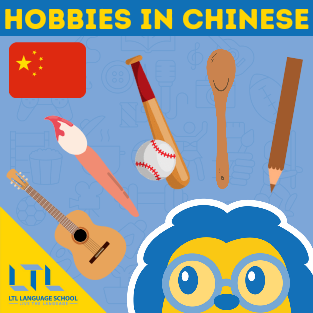
Learning to talk about hobbies is a super fun way to expand your vocabulary and gain some cultural insights at the same time.
It’s also a great topic of conversation to break the ice with a stranger in any language and Chinese is no exception!
In this blog, we’re going to give you a list of need-to-know vocab so that you’re all set to chat away in Chinese about how you spend your spare time.
We’re also going to throw in some useful phrases and questions to really get the ball rolling!
Now, let’s get learning…
Hobbies in Chinese || Useful Vocab and Phrases
Hobbies in Chinese || Sports
Hobbies in Chinese || Arts and Crafts
Hobbies in Chinese || Music
Hobbies in Chinese || Outdoor Activities
Hobbies in Chinese || Miscellaneous and Common Hobbies
Hobbies in Chinese || Example Dialogues
Hobbies in Chinese || FAQs
Hobbies in Chinese || Useful Vocab and Phrases
First things first, if you’re going to talk about hobbies in Chinese it’d probably help if you knew how to say “hobby”
👉 In Chinese, hobby is 爱好 àihào, or alternatively, interest is 兴趣 xìngqù.
So to talk about your hobbies and interests, you could use the following sentences and just fill in the blanks!

我的爱好是…
Wǒ de àihào shì…
My hobbies are…
我的兴趣是…
Wǒ de xìngqù shì…
My interests are…
Let’s look at some complete examples:
我的爱好是踢足球。
Wǒ de àihào shì tī zúqiú.
My hobby is playing football (or soccer for our American readers!)
我的兴趣是听音乐和唱歌。
Wǒ de xìngqù shì tīng yīnyuè hé chànggē.
My interests are listening to music and singing.
Perhaps the simplest and easiest way of expressing what your hobbies are is using the structure 我喜欢… Wǒ xǐhuān… which means “I like…”. For example:
我喜欢画画。 Wǒ xǐhuān huà huà. || I like drawing.
我喜欢旅行。 Wǒ xǐhuān lǚxíng. || I like traveling
我喜欢打篮球。 Wǒ xǐhuān dǎ lánqiú. || I like playing basketball.

Alternatively, you could talk about what you like to do in your free time (空闲时间 kòngxián shíjiān). That might look something like this:
我在空闲时间喜欢看电影。
Wǒ zài kòngxián shíjiān xǐhuān kàn diànyǐng.
In my spare time I like to watch movies.
Asking Questions
Conversation, however, is a two way street. So whilst it’s always nice to talk about ourselves, it’s generally advised to show interest in the person you’re chatting to at the same time!
So here’s some some questions you could use to ask about other people’s hobbies and interests:
你有什么爱好? Nǐ yǒu shénme àihào? || What are your hobbies?
你有什么兴趣? Nǐ yǒu shénme xìngqù àihào? || What are your interests?
你喜欢做什么? Nǐ xǐhuān zuò shénme? || What do you enjoy doing?
你空闲时间喜欢做什么? Nǐ kòngxián shíjiān xǐhuān zuò shénme? || What do you like doing in your spare time?
PROTIP || if you’d like to steer the conversation a certain way, you could even ask specifically about a certain topic using the following structure:
你喜欢什么…?
Nǐ xǐhuān shénme…?
What ___ do you like?
For example:
你喜欢什么运动? Nǐ xǐhuān shénme yùndòng? || What sports do you like?
你喜欢什么音乐? Nǐ xǐhuān shénme yīnyuè? || What kind of music do you like?
These phrases should certainly be enough to get you started in a conversation all about hobbies!
Now, let’s get into more specific vocabulary…

12 of the Best Resources to Learn Chinese | Our Complete List
We are lucky enough to have access to more resources than ever before and it’s all at our fingertips but what are the best resources to learn Chinese?
Hobbies in Chinese || Sports
Being able to talk about sports is a great way to bridge cultural gaps.
Whether that be talking about your favourite basketball team or discussing the best places to go for a swim or cycle, this topic can really be an ‘in’ to building connections and friendships in China.
So here’s a list of must-know sports vocabulary!
Note: some words, such as ‘basketball’ (篮球 lánqiú)require a verb, such as ‘play’ (打 dǎ). These verbs differ between sports and may follow different patterns than in English. To keep it simple, we’ve attached the appropriate verb, when needed, to each of these sports.
| English | Chinese | Pinyin |
|---|---|---|
| Play basketball | 打篮球 | dǎ lánqiú |
| Play soccer/football | 踢足球 | tī zúqiú |
| Play volleyball | 打排球 | dǎ páiqiú |
| Play tennis | 打网球 | dǎ wǎngqiú |
| Play table tennis | 打乒乓球 | dǎ pīngpāngqiú |
| Swim | 游泳 | yóuyǒng |
| Run | 跑步 | pǎobù |
| Ride a bicycle | 骑自行车 | qí zìxíngchē |
| Ice skate | 滑冰 | huábīng |
| Ski | 滑雪 | huáxuě |
| Dance | 跳舞 | tiàowǔ |
| Play golf | 打高尔夫球 | dǎ gāo’ěrfūqiú |
| Rollerblade | 溜冰 | liūbīng |
| Play badminton | 打羽毛球 | dǎ yǔmáoqiú |
| Play baseball | 打棒球 | dǎ bàngqiú |
| Play hockey | 打曲棍球 | dǎ qūgùnqiú |
| Play American football | 踢美式足球 | tī měishì zúqiú |
| Play handball | 打手球 | dǎ shǒuqiú |
| Play rugby | 打橄榄球 | dǎ gǎnlǎnqiú |
| Play squash | 打壁球 | dǎ bìqiú |
| Exercise/Fitness | 健身 | jiànshēn |
| Learn Taekwondo | 学跆拳道 | xué táiquándào |
| Learn Judo | 学柔道 | xué róudào |
| Play badminton | 打羽毛球 | dǎ yǔmáoqiú |
| To do boxing | 打拳击 | dǎ quánjī |
| To do Tai Chi | 打太极 | dǎ tàijí |
| Cheerleading | 啦啦队 | lālā duì |
How many Chinese sports stars do you know? Learn some of these big names and you’ll take your Chinese small talk to the next level!



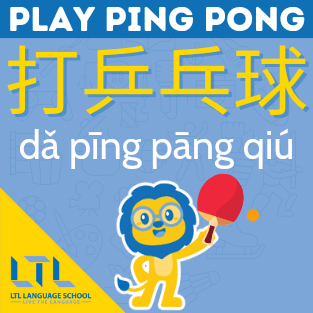

Hobbies in Chinese || Arts and Crafts
Ok aspiring Picassos out there, it’s your turn!
Artistic hobbies can vary greatly in different countries. For example, if you hear ‘paper cutting’, you might immediately think of making snowflakes or just those pesky little finger wounds!
But in China, paper cutting (剪纸 jiǎnzhǐ) looks more like this…
So, even if you draw like you have two left hands, it’s worth learning a few arts and crafts words in Chinese so you can have the chance to learn about not only people’s hobbies, but the surrounding culture too.
Let’s take a look at all the vocab you’ll need to get you talking about creative hobbies in Chinese.
| English | Chinese | Pinyin |
|---|---|---|
| Art | 艺术 | yìshù |
| Painting/Drawing | 画画 | huàhuà |
| Sewing | 缝纫 | féngrèn |
| Knitting | 针织 | zhēnzhī |
| Embroidery | 刺绣 | cìxiù |
| Paper cutting | 剪纸 | jiǎnzhǐ |
| Pottery | 陶艺 | táoyì |
| Sculpting | 雕刻 | diāokè |
| Woodworking | 木工 | mùgōng |
| Sketching | 素描 | sùmiáo |
| Watercolor painting | 水彩画 | shuǐcǎihuà |
| Photography | 摄影 | shèyǐng |
| Flower pressing | 压花 | yāhuā |
| Tailoring | 剪裁 | jiǎncái |
| Visiting museums | 参观博物馆 | cānguān bówùguǎn |
| Visiting exhibitions | 参观展览 | cānguān zhǎnlǎn |


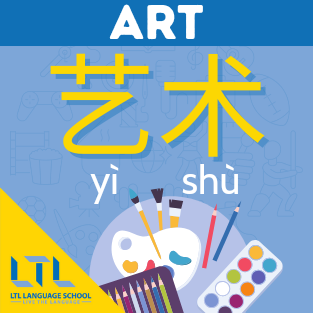

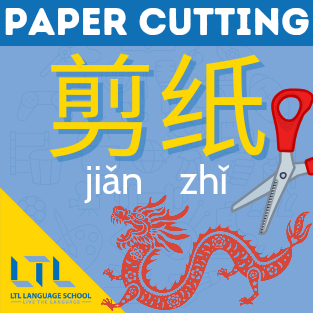
Hobbies in Chinese || Music
Whether you’re a fan of crafting performances for the big stage or just singing in the shower, music is a great way to bring people together.
Learning to talk about music will also help you delve even deeper into the world of modern Chinese pop culture.
Not to mention, KTV, or Chinese Karaoke, is a big deal in China and something you should know about!
Here’s an easy(ish) song we’d recommend, if you want to keep one up your sleeve – a song with no less 188 million Youtube views at that!
Once you’ve finished practicing your new stellar KTV performance, let’s take a look at some other music-related vocabulary you can use in China!
| English | Chinese | Pinyin |
|---|---|---|
| Listening to music | 听音乐 | tīng yīnyuè |
| Singing | 唱歌 | chànggē |
| Dancing | 跳舞 | tiàowǔ |
| Writing songs | 写歌 | xiěgē |
| Playing a musical instrument | 演奏乐器 | yǎnzòu yuèqì |
| Playing the guitar | 弹吉他 | tán jítā |
| Playing the piano | 弹钢琴 | tán gāngqín |
| Playing the flute | 吹长笛 | chuī chángdí |
| Playing the drums | 敲打鼓 | qiāo dǎ gǔ |
| Playing the bass guitar | 弹贝斯 | tán bèisī |
| Playing the violin | 拉小提琴 | lā xiǎotíqín |
| Choir | 唱诗班 | chàngshī bān |
| Band | 乐队 | yuèduì |
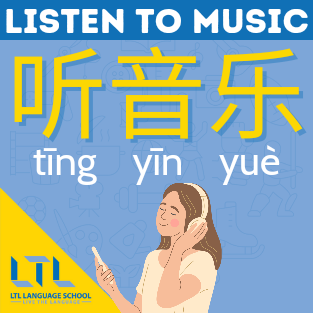
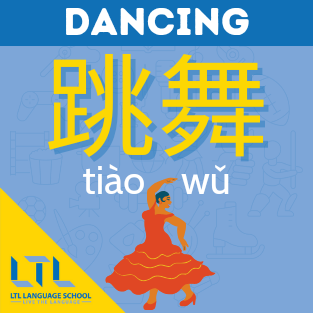


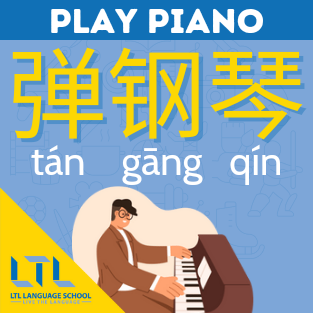
Hobbies in Chinese || Outdoor Activities
Calling all adventurers!
With so much incredible scenery in China, it definitely makes sense to spend some time in the great outdoors, whether that be at China’s magnificent coastlines or breathtaking mountain ranges.
And on that note, here’s a list of outdoorsy hobbies in Chinese to spark some conversations with your local friends.
| English | Chinese | Pinyin |
|---|---|---|
| Going to the beach | 去海滩 | qù hǎitān |
| Hiking | 爬山 | páshān |
| Picnicking | 野餐 | yěcān |
| Barbecuing | 烧烤 | shāokǎo |
| Fishing | 钓鱼 | diàoyú |
| Camping | 露营 | lùyíng |
| Rock climbing | 攀岩 | pānyán |
| Bouldering | 抱石 | bàoshí |
| Surfing | 冲浪 | chōnglàng |
| Sailing | 帆船运动 | fānchuán yùndòng |
| Horseback riding | 骑马 | qí mǎ |
| Cycling | 骑自行车 | qí zìxíngchē |
| Running | 跑步 | pǎobù |
| Walking | 散步 | sànbù |
| Playing golf | 打高尔夫球 | dǎ gāo’ěrfū qiú |
| Skiing | 滑雪 | huáxuě |
| Yoga | 瑜伽 | yújiā |
| Walk my dog | 遛狗 | liúgǒu |
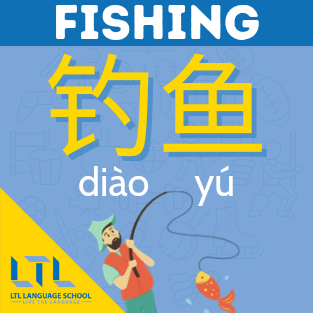





Let’s Hit the Seaside // All The Chinese Beach Vocabulary You Need
The ultimate guide to Chinese beach vocabulary! Let’s hit the beach in Chinese! Learn all our need-to-know words and phrases, and speak like a native.
Hobbies in Chinese || Miscellaneous Common Hobbies
A lot of our students like to respond to the question “你的爱好是什么?” (what are your hobbies?) with “睡觉!” (sleeping!) but we’re not letting you get away so easily today!
Here’s a list of some of the more common hobbies in Chinese, ranging from bookworm favourites to night owl activies.
| English | Chinese | Pinyin |
|---|---|---|
| Studying languages | 学习语言 | xuéxí yǔyán |
| Studying Chinese | 学习中文 | xuéxí zhōngwén |
| Reading books | 看书 | kànshū |
| Watching movies | 看电影 | kàn diànyǐng |
| Watching TV | 看电视 | kàn diànshì |
| Watching dramas | 看剧 | kàn jù |
| Travelling | 旅行 | lǚxíng |
| Hanging out with friends | 和朋友们出去玩 | hé péngyǒu men chūqù wán |
| Cooking | 做饭 | zuòfàn |
| Baking | 烘焙 | hōngbèi |
| Playing video games | 打游戏 | dǎ yóuxì |
| Playing board games | 玩桌游 | wán zhuōyóu |
| Playing chess | 下棋 | xiàqí |
| Playing cards | 打牌 | dǎpái |
| Shopping | 逛街 | guàngjiē |
| Drinking alcohol | 喝酒 | hē jiǔ |
| Going to bars | 去酒吧 | qù jiǔbā |
| Going clubbing | 去夜店 | qù yè diàn |
| Writing | 写作 | xiězuò |
| Photography | 摄影 | shèyǐng |
| Gardening | 园艺 | yuányì |
| Collecting… | 收藏… | shōucáng |
BONUS RESOURCES
If your hobby was on that list, you might want to check out one of these related articles:
- Chess in Chinese
- 10 Greatest Chinese Movies
- Top 24 Unmissable Chinese Dramas
- Best Chinese TV Shows for Practicing Mandarin
- How to Use Chinese Graded Readers
- Chinese Cooking Essentials
- Chinese Board Games PLUS Vocab



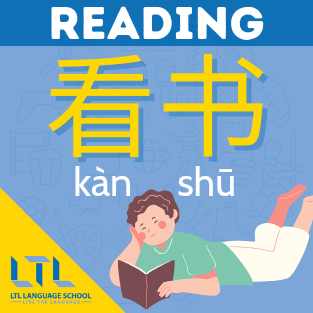
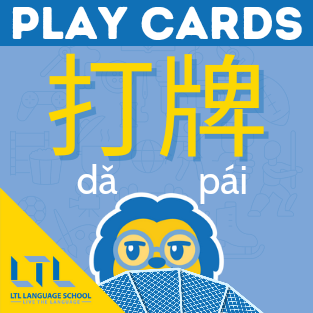

Hobbies in Chinese || Example Dialogues
Ok now let’s consolidate some of that new knowledge and see these hobby words in action.
Below are three dialogues for you to read, each accompanied by pinyin and English translations.
TOP TIP || read the whole dialogues before reading the English translations to really put your comprehension to the test!
Dialogue 1
A: 你有什么爱好?(Nǐ yǒu shénme ài hào?)
B: 我喜欢听音乐和看电影。(Wǒ xǐhuān tīng yīnyuè hé kàn diànyǐng.)
A: 很有趣!我喜欢画画和读书。(Hěn yǒuqù! Wǒ xǐhuān huàhuà hé dúshū.)
B: 那我们可以一起画画或者去看电影。(Nà wǒmen kěyǐ yìqǐ huàhuà huòzhě qù kàn diànyǐng.)A: What are your hobbies?
B: I like listening to music and watching movies.
A: That’s interesting! I like painting and reading books.
B: Then we can paint together or go watch a movie.
Dialogue 2
A: 你平时喜欢做什么?(Nǐ píngshí xǐhuān zuò shénme?)
B: 我喜欢打篮球和跑步。(Wǒ xǐhuān dǎ lánqiú hé pǎobù.)
A: 那听起来你很喜欢运动。(Nà tīng qǐlai nǐ hěn xǐhuān yùndòng.)A: What do you usually like to do?
B: I like playing basketball and running.
A: That sounds like you really enjoy sports.
Dialogue 3
A: 最近有什么新的爱好吗?(Zuìjìn yǒu shénme xīn de ài hào ma?)
B: 是的,我最近开始学习弹吉他。(Shì de, wǒ zuìjìn kāishǐ xuéxí tán jítā.)
A: 非常棒!学习音乐是很有意义的。(Fēicháng bàng! Xuéxí yīnyuè shì hěn yǒu yìyì de.)A: Do you have any new hobbies recently?
B: Yes, I recently started learning to play the guitar.
A: That’s great! Learning music is very meaningful.
And there we have it, a crash course into talking about hobbies in Chinese!
What’s your hobby? Let us know in the comments – bonus points for writing it in Chinese!
Hobbies in Chinese || FAQs
How do you say ‘hobby’ in Chinese?
‘Hobby’ in Chinese is 爱好 ài hào.
If you’re not sure how to pronounce this, check out our pronunciation tool to help you get the hang of speaking Mandarin!
What are some useful phrases for discussing hobbies in Chinese?
Useful phrases include “我喜欢…” (Wǒ xǐhuān…, meaning “I like…”), “我的爱好是…” (Wǒ de ài hào shì…, meaning “My hobby is…”), and “我经常做…” (Wǒ jīngcháng zuò…, meaning “I often do…”).
How can I ask someone about their hobbies in Chinese?
You can ask someone about their hobbies by using phrases like “你有什么爱好?” (Nǐ yǒu shénme ài hào?) meaning “What are your hobbies?” or “你喜欢做什么?” (Nǐ xǐhuān zuò shénme?) meaning “What do you like to do?”
Are there any specific verbs I should know when discussing hobbies in Chinese?
Yes, some common verbs used with hobbies include “打” (dǎ, to play), “看” (kàn, to watch), “听” (tīng, to listen), and “学习” (xuéxí, to learn), depending on the activity.
What are some traditional Chinese hobbies?
Some traditional Chinese hobbies include practicing calligraphy, playing Chinese musical instruments, practicing Tai Chi, and engaging in Chinese painting.
How can I practice speaking about hobbies in Chinese?
There’s lots of ways!
To improve your vocabulary retention rate, you could use a flashcard app. For improving your conversational skills, you could take a class all about hobbies on our Flexi Classes platform.
To join a Chinese language learning community, you could also get involved in the LTL Discord channel, where you can access free Chinese language materials and chat away in Chinese with other learners!
Want more from LTL?
If you wish to hear more from LTL Mandarin School why not join our mailing list.
We give plenty of handy information on learning Chinese, useful apps to learn the language and everything going on at our LTL schools!
Sign up below and become part of our ever-growing community!


 Hi, my name is Mojca. I am from Slovenia in Europe and I work as a student advisor at our Beihai school.
Hi, my name is Mojca. I am from Slovenia in Europe and I work as a student advisor at our Beihai school.




